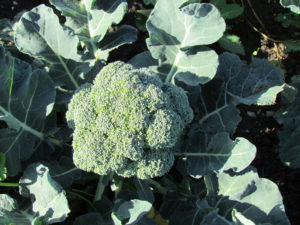
Organic Seed Alliance has released four new reports for California organic seed producers and farmers. They include three organic variety trial reports from on-farm research conducted over the 2013 – 2014 growing season and proceedings from the first California Organic Seed Summit held in February of 2015.
This report is the result of a variety trial conducted in 2013 and 2014 by Organic Seed Alliance and Coke Farm in northern San Benito County, California. The trial included 13 varieties of open-pollinated, public domain broccoli that were grown and evaluated for plant size, rate of growth, maturity date, head quality, side shoot production, and plant health. The report includes trialing materials and methods, results and discussion, and conclusions.
Download the California Organic Broccoli Variety Trial 2013-2014 report here.
This report is the result of a variety trial conducted in 2013 and 2014 by Organic Seed Alliance and Pinnacle Organic Farm in northern San Benito County, California. The trial included eight varieties of Lacinato-type kale that were grown and evaluated for vigor and productivity. The report includes trialing materials and methods, results and discussion, and conclusions.
Download the California Organic Kale Variety Trial 2013-2014 report here.
This report is the result of a variety trial conducted in 2013 and 2014 by Organic Seed Alliance and Pinnacle Organic Farm in northern San Benito County, California. The trial included nine rutabaga varieties and one white-fleshed turnip that were grown and evaluated for their emergence rate, root quality and appearance, and storability. The report includes trialing materials and methods, results and discussion, and conclusions.
Download the California Organic Rutabaga Variety Trial 2013-2014 report here.
California is the nation’s leading producer of vegetable seed thanks to its ideal climate and growing conditions. Yet there is a need to strengthen the state’s organic seed system. According to OSA’s 2009 and 2014 State of Organic Seed surveys, of the 218 California organic farmers surveyed, 73% agreed that organic seed is important to maintaining the integrity of organic food production. Still, they reported that less than 30% of the vegetable acres they grew were planted with organic seed. Why are California farmers relying on conventionally produced seed? When asked what factors were causing them not to buy organic seed, California organic farmers pointed to a general lack of diversity in varieties available in an organic form as well as insufficient quantities. In February of 2015, organic seed producers and organic seed distributors met for the 1st California Organic Seed Summit to identify collective actions they could take to create a stronger organic seed system in California.
Download the Proceedings of the 1st California Organic Seed Summit here.
Funding for the trial reports was provided by Columbia Foundation and Gaia Fund. Funding for the California Organic Seed Summit proceedings was provided by Seed Matters and Gaia Fund.
